
You are reading:

You are reading:
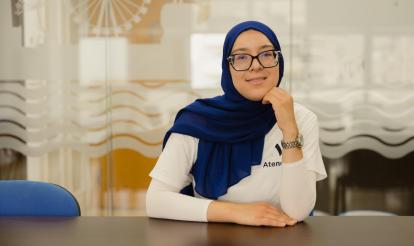
08.09.25
5 minutes readYousra Jellam (Morocco, 21 years old) is one of the first participants in the Más Empleo (More Employment) programme run by the Málaga-based organisation CODENAF. Thanks to this initiative, promoted by the European Social Fund Plus and the ”la Caixa” Foundation to improve the employability of people in vulnerable situations, Yousra trained in Home Hygiene and Health Care Assistance. Today she works at Atende, a company specialising in social care services, where she has now been employed for a year.
“I’m very interested in the care sector and in supporting older people,” explains the young woman, who combines her work with her studies in order to continue growing in the field of care.
“Our goal is to improve their employability and help them achieve social and labour integration in the job market,” says Salima El Meziani, general technical coordinator at CODENAF and head of the Más Empleo project at the organisation, which works to support the integration of migrants and people of migrant origin.
The CODENAF project is one of 80 that have been selected across Spain as part of the Más Empleo call for proposals, which has a budget of 48 million euros financed by the European Social Fund and the ”la Caixa” Foundation. The funding is aimed at implementing measures that promote the active inclusion of people at risk of or experiencing social exclusion, through comprehensive pathways for social and labour integration that help facilitate their access to the job market.
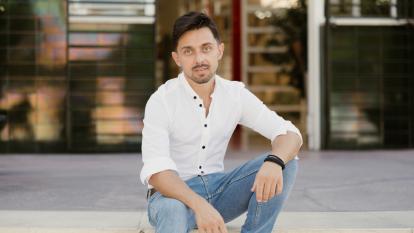
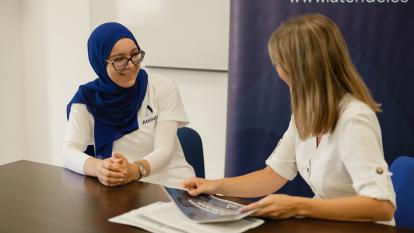

“The profile of the users we support,” explains El Meziani, “is very diverse: young people, women over 50, single mothers and individuals experiencing long-term unemployment.”
One of them is Dmytro Beziazychnyi, a 21-year-old Ukrainian refugee who arrived in Málaga four months ago, referred by the Red Cross, and who began his journey with training to become a fishmonger. “I learned a lot during the training and the work placement, and I felt very supported by the teachers,” he says. For the past two months, he has been working at a Carrefour supermarket.
Having a job is key to reversing situations of vulnerability like those faced by Dmytro or Yousra. In Spain, 1 in 4 people – 25.8% of the population – is at risk of poverty or social exclusion, according to the latest Eurostat data.
CODENAF carries out its work in partnership with other social organisations, community services and the Andalusian Employment Service, which refer participants to the project.
One of the strengths of this funding call is its duration: it will run until 2029. “This gives us team stability, which allows us to support people over the long term and provide more focused attention in each individual case,” El Meziani points out. “If a year goes by and the person hasn’t found a job or achieved their goals, we see them again the following year.”
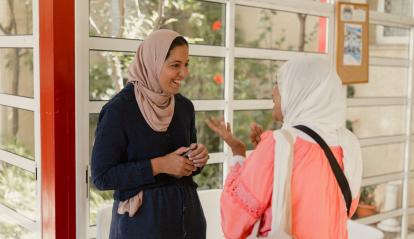
The pathway to social and professional integration designed by CODENAF begins the moment a person arrives at the organisation. “In that initial welcome, we check that they meet the requirements: being of legal age, living in Málaga and having a regularised status,” explains the specialist. And if their documentation is not in order, CODENAF’s legal department offers guidance to help them begin the regularisation process.
Once inside the programme, the “diagnostic phase” begins to personalise the support. The next step is vocational training. “So far this year, we’ve already delivered six different types of training, and all the courses include work placements in companies,” says El Meziani.
And the follow-up does not stop there. “After the placements, if the person isn’t hired or if the contract isn’t long-term, we continue working with them through business outreach and job mediation to help them achieve stability,” she adds.
One of the key strengths of CODENAF’s pathway is the quality of its training courses, which in most cases offer a professional certificate.
Thanks to the support of the Más Empleo call, the organisation has been able to strengthen two essential aspects: equipment and partnerships with companies.
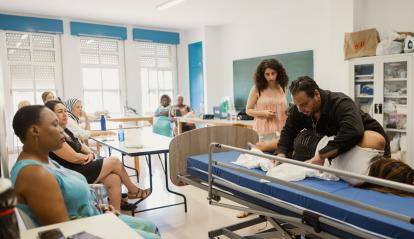
“For the training in Home Hygiene and Healthcare Assistance, for example, it’s very important to have an adjustable bed and to cover the cost of renting a hoist,” explains El Meziani.
As for relationships with companies, the programme has enabled them to reach sectors in which they had not previously worked. “The retail sector was, for us, uncharted territory. Now, we offer courses in butchery, bakery and fishmongery. And the truth is that they’re proving to be very beneficial for the people we support,” she adds.
Access to employment is not the only goal. “At CODENAF, we’re not focused on the number of people we assist, but on the quality of the care we provide. Beyond labour market integration, we seek the social integration of the people we support in all aspects,” says El Meziani.
For young people like Dmytro and Yousra, being able to train and find their first job has been a life-changing experience. “My goal now is to keep improving my Spanish and to work so I can save up and move out of the shelter flat,” he explains. She, meanwhile, envisions a professional future in the care sector.
Initiatives such as Más Empleo are essential for those who start out at a disadvantage to access a genuine framework of equal opportunities, improve their quality of life and build a more stable future.
This call is in addition to two others, Más Empleo Joven (More Youth Employment) and Más Infancia (More Childhood), which have also been launched by the European Social Fund Plus and the ”la Caixa” Foundation in its role as an intermediary body. Together, they have a budget allocation of 124 million euros.